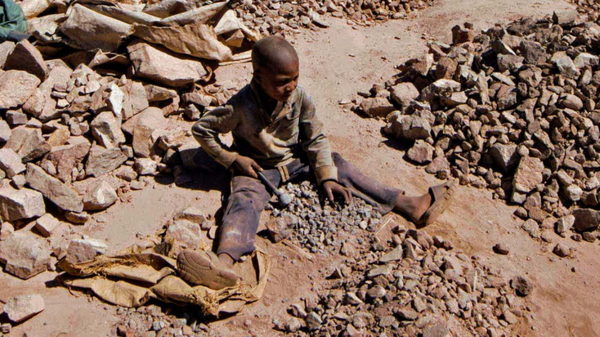By Nick Pope
In order to facilitate electric vehicle (EV) production, the U.S. is seeking to spend taxpayer dollars to develop cobalt supply chains from the Democratic Republic of the Congo (DRC), a country which is known for high prevalence of unsafe child labor in its mines, many of which are controlled by Chinese interests, The Wall Street Journal reported Thursday.
The United States Agency for International Development (USAID) and the Department of Labor (DOL) are jointly committing $23 million in taxpayer funds to U.S. firms and other mining companies to integrate local Congolese operations and “artisanal” mines into their supply chains, as well as to improve labor standards for miners in the DRC, which are essentially nonexistent in most cases, according to the WSJ. Chinese-controlled interests dominate the DRC’s cobalt industry, refining about 75% of the global cobalt supply and manufacturing approximately 70% of the world’s lithium-ion batteries, which are cobalt-intensive products that power EVs.
Cobalt is one of the key materials needed to build batteries for EVs, a technology which the Biden administration is pursuing aggressively as a pillar of its sweeping climate agenda, according to the Cobalt Institute. The Environmental Protection Agency (EPA) proposed stringent new tailpipe emissions standards in April which would effectively require American automobile manufacturers to have their new fleets be 67% EVs after model year 2032, and the National Highway Traffic Safety Administration unveiled a proposal to update the Corporate Average Fuel Economy requirements that would, if finalized, amount to “an EV mandate,” Dan Kish, senior fellow for the Institute for Energy Research, told the Daily Caller News Foundation at the time.
Widespread adoption of EVs is set to facilitate the Biden administration’s goal of having the U.S. economy reach net-zero carbon dioxide emissions by 2050. The idea behind the spending is to incentivize American technology companies and auto manufacturers to invest in establishing safer and more ethical Congolese supply chains which will in turn bolster their businesses, but corporate concerns regarding security and governance in the country persist.
Nearly a third of the DRC’s cobalt is extracted by “artisanal” miners, meaning that the unearthed material and the mines it comes from are not contracted to any particular corporation, according to the WSJ. Western countries have historically tried to not rely on artisanal miners, who generally sell their ores to local merchants who then sell the product to corporations and refiners.
Hundreds of thousands of people labor as artisanal miners in the DRC, a figure which is much larger than the number of people employed by more established operations which utilize heavy machinery, according to the WSJ. There were about 40,000 children laboring in unsafe Congolese cobalt mines as of 2021, according to the Wilson Center.
Previous attempts by Western institutions, such as a Swiss company, to organize the DRC’s artisanal mining have so far resulted in failure, according to the WSJ.
Republican Rep. Chris Smith of New Jersey introduced the Countering China’s Exploitation of Strategic Metals and Minerals and Child and Forced Labor in the Democratic Republic of Congo Act in June, which would prohibit the importation of all products containing cobalt and lithium extracted by child miners and victims of labor trafficking in the DRC if it becomes law.
The White House, USAID and DOL all did not respond immediately to requests for comment.
Nick Pope is a contributor at The Daily Caller.
To read more about the human costs of net zero, click here.
To read more about domestic mining, click here.
